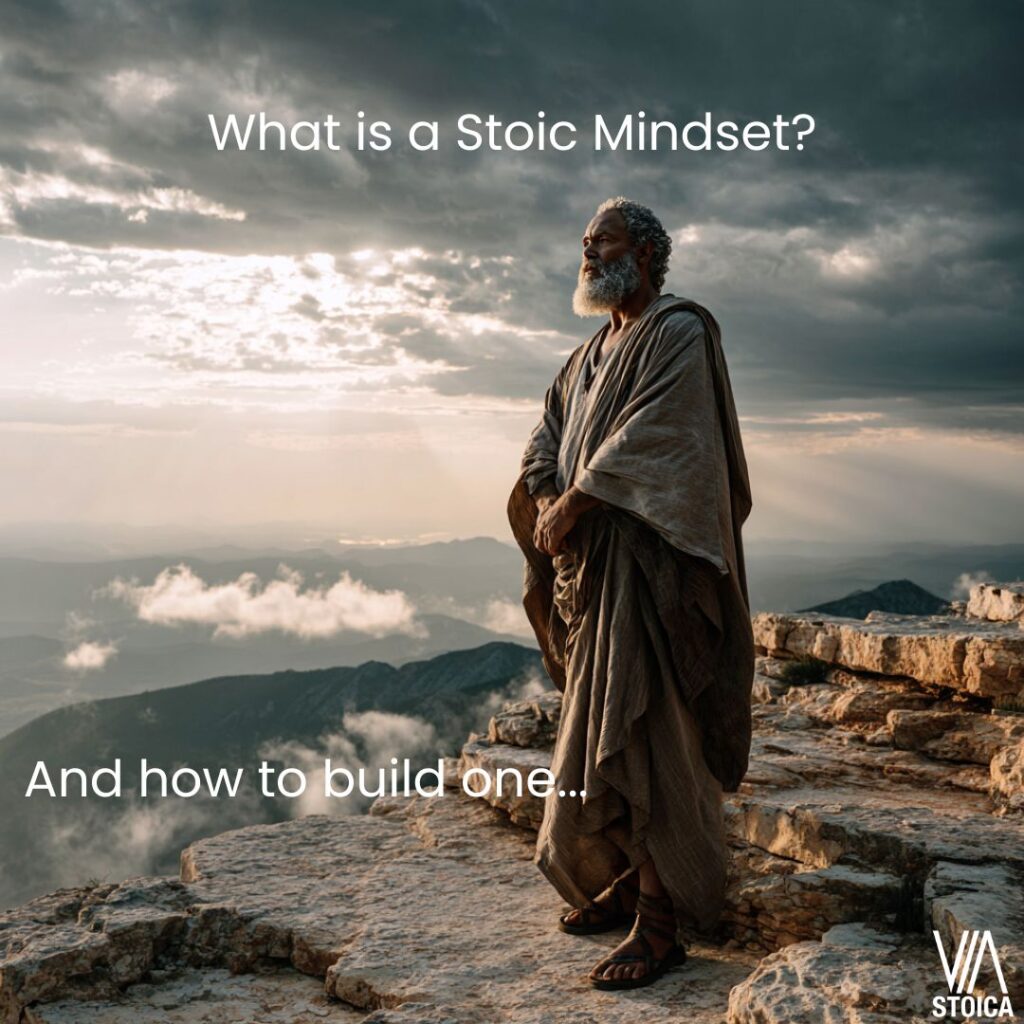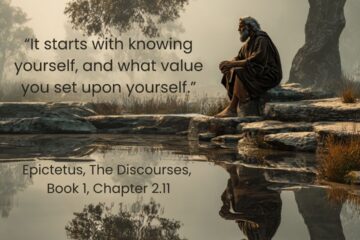
A Stoic mindset is not about numbing yourself. It is about seeing clearly, choosing virtuously, and cooperating with reality. You train your mind to respond with reason, not impulse, and to root your happiness in your character rather than in circumstances.
“Your soul takes on the color of your thoughts.”
Marcus Aurelius, Meditations, Book 5.16
When you think like a Stoic, every challenge becomes training, every day a chance to practice wisdom, justice, courage, and self-control.
The Core Principles of a Stoic Mindset
1) Virtue Is the Only True Good
For the Stoics, virtue, wisdom, justice, courage, and temperance, is the only thing that can make a life truly good. Everything else is classed as an indifferent. Health, wealth, reputation, pleasure, even long life, can be used well or badly. What matters is the use you make of them.
“Virtue, he [Zeno] holds, is a harmonious disposition, choice-worthy for its own sake and not from hope or fear or any external motive. Moreover, it is in virtue that happiness consists; for virtue is the state of the mind which tends to make the whole of life harmonious.”
Diogenes Laertius, Book 7, Zeno, 89
A Stoic mindset begins with the question: What is the right thing to do here? Once you commit to that, outcomes stop ruling you. You measure yourself by your choices, not by fortune.
Practice: Before decisions, name the relevant virtue.
- Wisdom: What is true here?
- Justice: What is owed to others?
- Courage: What fear must I face?
- Temperance: What desire must I govern?
This quick check pulls you from impulse back to principle.
2) Live in Accordance with Nature
To live in accordance with nature is to live in accordance with reason, the defining quality that sets human beings apart. The Stoics believed that nature is not chaotic, but rationally ordered through the Logos, the universal reason that governs all things. When we act with reason and integrity, we act in harmony with that order.
“For we must employ Nature our guide; it is she whom reason looks to, she whose counsel it takes. It is therefore one and the same thing to live happily and to live in accordance with nature.”
Seneca, Dialogues and Essays, On the Happy Life, 8
To live according to nature is not to retreat into forests or reject civilization. It means to study the patterns of nature, its patience, its cooperation, its cycles, and apply those lessons to your own conduct. Just as nature never hurries and yet everything is accomplished, you too can act calmly and purposefully, trusting that things unfold as they must.
The Stoic life, then, is one of observation and imitation: watching how nature accepts change, loss, and renewal without complaint, and learning to do the same in your own life. To live naturally is to live rationally, fulfilling your role as a conscious participant in a larger, ordered whole.
Practice: Learn from nature itself.
- Watch how the seasons change without resistance, and practice the same acceptance toward change in your own life.
- Notice how everything in nature works for the whole, and act with justice and cooperation toward others.
- When facing difficulty, remember that storms, too, are part of nature’s balance, so face yours with calm and dignity.
- Let reason, not impulse, guide your actions, just as nature follows its own laws without haste or complaint.
By observing and aligning with the wisdom of nature, you learn the rhythm of the Stoic life: steady, patient, rational, and in harmony with the world as it is.
3) Focus on What You Can Control
This principle flows directly from virtue. Since only moral choice, the faculty of prohairesis, can make us good or bad, it is the only thing that truly belongs to us. Everything else is borrowed from the world and must one day be returned.
“Some things are in our control and others not. Things in our control are opinion, pursuit, desire, aversion, and, in a word, whatever is our own action. Things not in our control are body, property, reputation, command, and, in one word, whatever is not our action.”
Epictetus, Handbook, 1
This short passage, which opens The Handbook of Epictetus, summarizes the Stoic view of freedom. The world will do as it must; people will act as they will; fate will unfold as it is destined to. But in the midst of all that, your power of judgment remains untouched.
The Stoic learns to make this distinction instinctive. Each disappointment, insult, or unexpected event becomes a test: Is this within my control or not? If it is, act well. If it isn’t, let it go. Freedom, for the Stoic, does not come from changing events; it comes from changing your relationship to them.
By aligning your efforts only with what depends on you, you conserve your energy, act more effectively, and free yourself from frustration. Most of life’s turmoil comes not from what happens, but from our futile resistance to what we cannot change.
Practice: The Two-Column Check
Divide your attention like this:
- Left column: “Up to me” — my judgments, choices, intentions, and actions.
- Right column: “Not up to me” — outcomes, opinions of others, timing, reputation, and external events.
Before you act, pause for a second and shift your focus to the left column. Then move your body.
Over time, this practice reorients your whole way of thinking. You begin to act with purpose rather than panic, to accept rather than resist, and to stand firm no matter what happens. That is the freedom Epictetus meant, the freedom that no one can take away.
4) Understand and Master Your Emotions
The Stoics saw emotions as judgments, born from the beliefs we hold about what is good or bad. When we mistake external things for true goods or evils, wealth, reputation, pleasure, pain, and emotions arise as natural consequences of those mistaken beliefs.
“They [Hecato and Zeno] hold the emotions to be judgments, as is stated by Chrysippus in his treatise on the Passions: avarice being a supposition that money is a good, while the case is similar with drunkenness and profligacy and all the other emotions.”
Diogenes Laertius, Lives of Eminent Philosophers, Book 7, Zeno, 110
Here, Chrysippus explains that every emotion is rooted in a false judgment of value.
Avarice is the belief that money is good, lust is the belief that pleasure is good, and fear is the belief that pain or loss is evil. These mistaken judgments disturb the soul’s harmony and pull it away from reason.
But the Stoics did not seek to suppress emotion. They aimed to understand and transform it. The wise person still experiences natural stirrings of feeling, what the Stoics called propatheiai, or “first movements”, but does not assent to irrational impressions. Instead, they cultivate good emotions (eupatheiai):
- Joy, arising from virtuous action;
- Wish, directed toward genuine good;
- Caution, guarding against moral error.
These are emotions in harmony with reason, virtue, and in accordance with nature.
Emotional freedom, for the Stoic, does not mean becoming unfeeling. It means learning to feel what is real. When you understand that your peace depends only on your judgments, not on circumstances, you are no longer carried away by passion.
Practice: When emotion rises, trace it back to its judgment.
Ask yourself:
- What am I believing right now that gives rise to this feeling?
- Is that belief true in Stoic terms?
- What would the wise person believe here?
With each honest reflection, emotion turns from turmoil into teaching. You begin to feel less at the mercy of moods and more aligned with reason, a mind steady, lucid, and free.
5) The Love of Fate
Acceptance, for the Stoics, is not passivity; it is participation. To accept, or better yet, love fate is to recognize that every event is part of a greater, rational order. What happens to you is not random; it belongs to the same cosmic web that binds all things together. When you resist what is, you pull against nature itself. When you accept it, you move in rhythm with the universe.
“There are two reasons to embrace what happens. One is that it’s happening to you. It was prescribed for you, and it pertains to you. The thread was spun long ago, by the oldest cause of all. The other reason is that what happens to an individual is a cause of well-being in what directs the world—of its well-being, its fulfillment, of its very existence, even.”
Marcus Aurelius, Meditations, 5.8
Marcus reminds us that what unfolds for us is both personal and universal. It belongs to us because it shapes our character, and it belongs to the world because it sustains the harmony of the whole. Every challenge, every loss, every unexpected turn contributes to the larger order of things and gives us the opportunity to practice virtue.
Trust the logic of the Logos
This attitude does not mean blind surrender. It means trusting the logic of the Logos, the rational principle that orders the cosmos. The Stoic learns to cooperate with fate, acting nobly within the role assigned, rather than demanding a different script.
When you see your life as part of this unfolding whole, peace replaces protest. You stop asking, Why me? and start asking, How can I respond with virtue here?
Practice: Work with fate, not against it.
- When things go differently than planned, remind yourself: This was prescribed for me, not as punishment, but as practice.
- In difficulty, look for the virtue it calls forth: courage in adversity, patience in delay, gratitude in success.
- Reflect often on how your small part sustains the greater whole, how your calm, your justice, your reason contribute to the order of things.
To accept fate with serenity is to say yes to life as it is, not as you wish it to be. This is the essence of the Stoic spirit, a trust that whatever happens, you have the freedom to meet it with wisdom and grace.
How to Practice a Stoic Mindset Daily
Here is a compact routine you can start today:
- Morning note to self
- Name your role and duties for the day. Add the reserve clause.
- Visualize at least one likely setback and the virtue you will use.
- Name your role and duties for the day. Add the reserve clause.
- Control check at transitions
- Before meetings, messages, or decisions, do the two-column check.
- Act on the “up to me” side, release the rest.
- Before meetings, messages, or decisions, do the two-column check.
- Emotion audit in the moment
- Identify the belief under the feeling.
- Correct false valuations of externals.
- Replace with a true aim: wise action here and now.
- Identify the belief under the feeling.
- View from above
- Zoom out for one minute. See your worry inside the larger whole.
- Let perspective soften urgency and invite justice and temperance.
- Zoom out for one minute. See your worry inside the larger whole.
- Evening review
- Three lines: Where I lived the virtues, Where I slipped, What I will do tomorrow.
- End with gratitude for any chance you had to practice.
- Three lines: Where I lived the virtues, Where I slipped, What I will do tomorrow.
The Benefits of a Stoic Mindset
- Stability under pressure
- Clearer decisions and fewer regrets
- Freedom from anxious attachment to outcomes
- Warmer relationships through justice and temperance
- A grounded joy that comes from living in line with what you believe
This is not about perfection. It is about prokopē, steady progress. You will miss, you will learn, and you will return to reason and try again.
Final Thoughts
A Stoic mindset is a daily art. Root your happiness in virtue, live in tune with nature, focus on what is up to you, transform emotions by reforming beliefs, accept fate with grace, and keep steady attention over your own mind.
Do this today, then do it again tomorrow. That is the path.
🔗 Related Reading
- How to Practice Stoicism: A Practical Guide to the Good Life
- What Is Prosochē? Understanding the Stoic Practice of Attention
- Stoic Reading List For Beginners
- Quote hubs for deeper study: [Marcus Aurelius Quotes], [Seneca Quotes], [Epictetus Quotes]
Want to Explore More Stoic Practices?
Book a free consultation with one of our Stoic Coaches to get support. Or check out our Stoic Book Reviews. Listen to The Via Stoica Podcast on Spotify, Apple Podcasts, or YouTube.
Author Bio
Benny Voncken is the co-founder of Via Stoica, where he helps people apply Stoic philosophy to modern life. He is a Stoic coach, writer, and host of The Via Stoica Podcast. With nearly a decade of teaching experience and daily Stoic practice, Benny creates resources, workshops, and reflections that make ancient wisdom practical today.


0 Comments